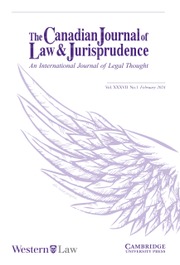Homelessness, Liberty and Property
In Homelessness, Liberty and Property, Terry Skolnik establishes a novel theory about the government's duties to end homelessness, maintain public property's value, and legitimize laws that regulate public space. In doing so, Skolnik provides new insight into how the property law system and the regulation of public space limit unhoused persons' freedom and political equality. The book deepens our understanding of how various areas of law, such as constitutional law, legal philosophy, criminal law, and property law, approach the reality of homelessness and advances original arguments to provide new justifications for the right to housing. Skolnik concludes by offering a set of concrete proposals for how the government can reduce the incidence of homelessness and treat unhoused persons with greater concern and respect. This title is part of the Flip it Open Programme and may also be available open access. Check our website Cambridge Core for details.
- Provides new insights into the harms of criminalizing homelessness
- Advances innovative justifications for the right to housing
- Bridges the gap between disciplines, including property law and criminal law, and fiduciary theory and republicanism
Product details
November 2024Hardback
9781009392679
208 pages
235 × 159 × 17 mm
0.44kg
Available
Table of Contents
- 1. Homelessness, vagrancy, and municipal ordinances
- 2. Homelessness and the constitution
- 3. Homelessness, liberty, and property
- 4. Homelessness and the insights of republicanism
- 5. Nonegalitarian coercion
- 6. Punitive entrenchment
- 7. Homelessness, public property, and the state's fiduciary duties
- 8. In defense of the state's fiduciary duties
- 9. Fulfilling the state's fiduciary duties.







